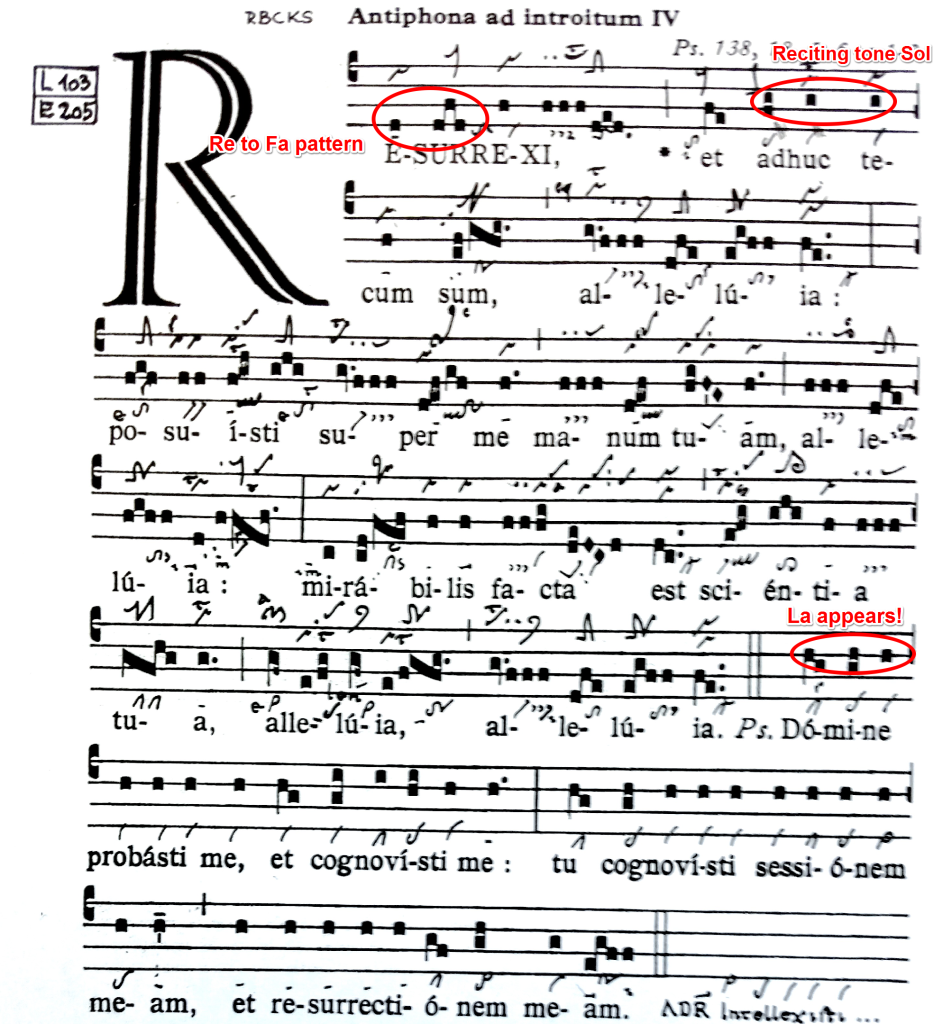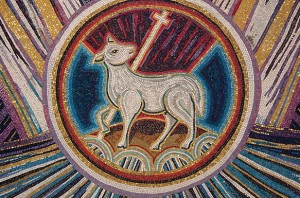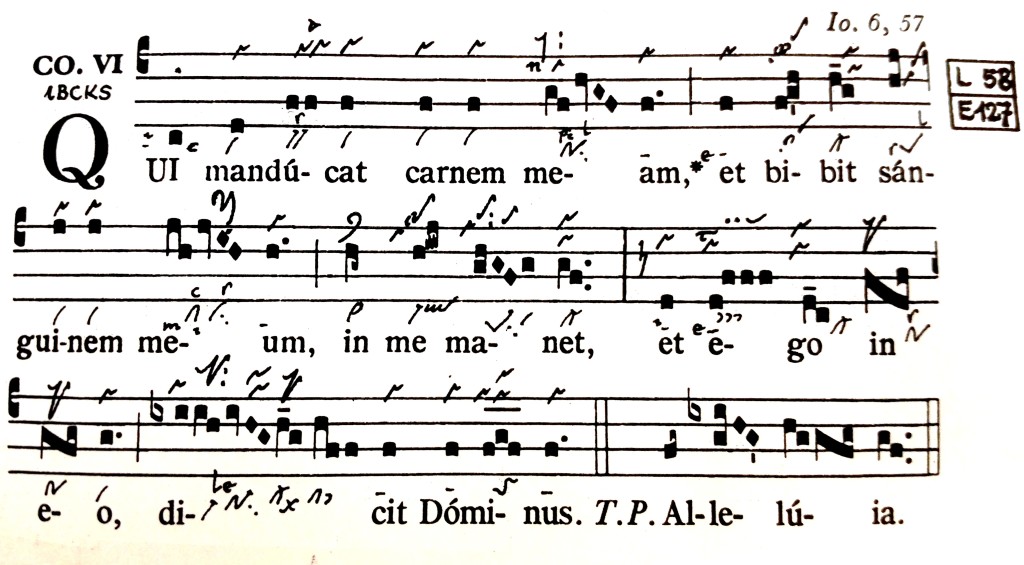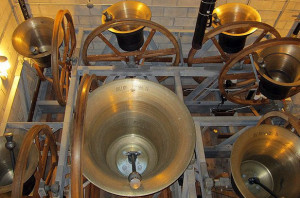Monthly Archives: March 2016
Pennies from Heaven

By Faithful Finch
I believe that if you listen to God, He’ll speak to you through little things. One of my good friends told me to always pay attention to pennies. They have “In God We trust” inscribed on them, and are a good reminder to trust in Him!
Ever since then, when I really need to be reminded that I can trust Him, inevitability, a penny will show up. Then there was the time God demonstrated His sense of humor (which I definitely needed right then!), by leading me to a restaurant that had a bathroom floor made of pennies!
EASTER: For He Has Triumphed Gloriously

The re-telling of the salvation story is essential in keeping our faith alive. Paul’s epistle reminds us that we are called to be witnesses of these great events and to pass them on.
I find echoes of the Exodus story in Mary Magdalene’s frantic response to discovering that the body of Jesus is no longer in the tomb. She runs off to alert the disciples. During times of uncertainty, we often want to get busy, doing something, rather than nothing. It is only when Mary returns to the tomb, standing still and weeping helplessly, that she encounters Jesus. At first, she is preoccupied with grief, and she does not recognize him. Only when He speaks to her does she realize it is the teacher himself, somehow risen from the dead. Mary returns to the disciples to announce that she has seen the Lord, thus earning the title bestowed on her by the ancient church, “apostle to the apostles”.
Mary’s telling of the good news is a task she has passed on to us. How do we recognize that we have seen the Lord, and how do we reveal this glorious truth to others? How do we dare speak of salvation and hope in a world so full of injustice, hatred, violence, and deadly accident?
This is the challenge and the mystery of Easter. For me it helps to remember that the victory song of Miriam is one of the most ancient in our scriptures. For many thousands of years the faithful have been able to stand tall and sing; “Sing to the Lord, for he has triumphed gloriously.”
By Kathleen Norris
Excerpted from God For Us, Paraclete Press
EASTER: For He Has Triumphed Gloriously

The re-telling of the salvation story is essential in keeping our faith alive. Paul’s epistle reminds us that we are called to be witnesses of these great events and to pass them on.
I find echoes of the Exodus story in Mary Magdalene’s frantic response to discovering that the body of Jesus is no longer in the tomb. She runs off to alert the disciples. During times of uncertainty, we often want to get busy, doing something, rather than nothing. It is only when Mary returns to the tomb, standing still and weeping helplessly, that she encounters Jesus. At first, she is preoccupied with grief, and she does not recognize him. Only when He speaks to her does she realize it is the teacher himself, somehow risen from the dead. Mary returns to the disciples to announce that she has seen the Lord, thus earning the title bestowed on her by the ancient church, “apostle to the apostles”.
Mary’s telling of the good news is a task she has passed on to us. How do we recognize that we have seen the Lord, and how do we reveal this glorious truth to others? How do we dare speak of salvation and hope in a world so full of injustice, hatred, violence, and deadly accident?
This is the challenge and the mystery of Easter. For me it helps to remember that the victory song of Miriam is one of the most ancient in our scriptures. For many thousands of years the faithful have been able to stand tall and sing; “Sing to the Lord, for he has triumphed gloriously.”
By Kathleen Norris
Excerpted from God For Us, Paraclete Press
EASTER: For He Has Triumphed Gloriously

The re-telling of the salvation story is essential in keeping our faith alive. Paul’s epistle reminds us that we are called to be witnesses of these great events and to pass them on.
I find echoes of the Exodus story in Mary Magdalene’s frantic response to discovering that the body of Jesus is no longer in the tomb. She runs off to alert the disciples. During times of uncertainty, we often want to get busy, doing something, rather than nothing. It is only when Mary returns to the tomb, standing still and weeping helplessly, that she encounters Jesus. At first, she is preoccupied with grief, and she does not recognize him. Only when He speaks to her does she realize it is the teacher himself, somehow risen from the dead. Mary returns to the disciples to announce that she has seen the Lord, thus earning the title bestowed on her by the ancient church, “apostle to the apostles”.
Mary’s telling of the good news is a task she has passed on to us. How do we recognize that we have seen the Lord, and how do we reveal this glorious truth to others? How do we dare speak of salvation and hope in a world so full of injustice, hatred, violence, and deadly accident?
This is the challenge and the mystery of Easter. For me it helps to remember that the victory song of Miriam is one of the most ancient in our scriptures. For many thousands of years the faithful have been able to stand tall and sing; “Sing to the Lord, for he has triumphed gloriously.”
By Kathleen Norris
Excerpted from God For Us, Paraclete Press
Good Friday
By Il Fratello
Today is good
Friday
And the hands of the church
Hold me
As I walk over these stones
We cannot do much
But make our way
Like the blind
Feeling texts written in raised letters
In fits and starts
I align myself with Christ
heroically
And tragically
Failing
To comprehend it all
I am most successful in slumber
Under the cloaks of the apostles
All of you in pain,
All of you suffering,
All of us,
Stop in our tracks
At the mystery
Of his willingness
The mystery of his blood rimmed eyes
That find me, you, each
Hidden in the crowd–
The only one who knows what I have done
And what of his inflicted pain was mine alone–
To say spirit to spirit
I forgive you
All.
Maundy Thursday: A Shared Meal

Maundy Thursday engages us in deep remembrance. Looking at Moses and Aaron as they prepare the first Passover meal in Egypt, we better understand what acts of remembrance can mean for a people, and a religion. The Passover seder is still at the heart of Jewish faith and tradition. And in that Passover supper in Jerusalem depicted in Luke we witness the birth of our own Eucharistic meal.
But I want us to pay attention to what happened not in Egypt or Jerusalem, but in the desert of Exodus, depicted in Psalm 78. God had worked many wonders for the people fleeing from slavery in Egypt: parting the Red Sea, leading by fire and by cloud, drawing water from hard rock to quench their thirst. Still, as time goes by and the hardships continue, their faith in God’s providence fails. In their hunger they doubt, and ask, “Can God spread a table in the wilderness?” In response, God sends them manna, bread from heaven.
We have been given so many great gifts in our lives, and in the lived tradition of our faith communities. The opportunity to gather in worship with others at the eucharistic table is a blessing beyond compare. But we often take it for granted, and when we face a desert journey – through illness, divorce, job loss, or any unwelcome change – we are still capable of asking if God can provide enough nourishment to see us through.
Even worse, we may be so distracted, enslaved by a desire for worldly goods, that we, like Jesus’s disciples, fail to comprehend the gifts are right before us. Any meal shared with those we love, whether it be at the altar or around a kitchen table, can be a foretaste of the heavenly feast to come, if only we will heed the words of the traditional Maundy Thursday hymn, “Ubi Caritas”, which asks us to set aside our bitterness and quarreling and remember that “where charity and love are found, there is God.”
By Kathleen Norris
excerpted from God For Us, Paraclete Press
The Passion Narrative
Change ringing
 Plain Bob, Plain Hunt, 3-4 down, 3-4 up…minimus, minor major…circle of work, top of the stroke, and sallies, clappers, and stays. The words circled around me, like flying elephants with very small wings, heavy, dense and ready to come crashing down at any moment. Wow – this was not quite as I imagined.
Plain Bob, Plain Hunt, 3-4 down, 3-4 up…minimus, minor major…circle of work, top of the stroke, and sallies, clappers, and stays. The words circled around me, like flying elephants with very small wings, heavy, dense and ready to come crashing down at any moment. Wow – this was not quite as I imagined.
I had watched our band of bell ringers since our tower was dedicated in 2009. Their perseverance and dedication was obvious. Over time the rhythm of their rings had steadily improved, and the patterns they rang became more complex. I had always been intrigued by the quiet focus of the band during their post – service ringing. It was a team sport of the most intricate and subtle kind. Faces focused, no one uttering a word, eyes all looking to the center of their circle. How one word by the leader, “bob”, could make them all change the timing of their bells and create another pattern. It was a bit like a secret world of sound, ringing the rest of us into and out of our beloved church for worship, elections, passings, all the most important moments of our life together.
Receiving a letter of invitation from our tower captain last March, I jumped at the chance to be a part of this. Despite the obvious complexity, it seemed doable. I was well trained in rhythms from years of playing an instrument. It couldn’t be that hard – pull on the rope, let the bell swing a bit, pull again…
Wow – how wrong I was! I found out it was not “bell ringing”, but “change ringing”, and letting a 500lb bell swing with only a 15ft rope to control it through a complex pattern of “changes” was an art that will take a lifetime to master. I have so much to learn and many teachers here to help me, and I am finding there is no shame in this experience. As one who has never taken easily to the spiritual principal of “being wrong” and of humility, it has actually been a joy (mostly) to fail miserably amongst my brothers and sisters, in pursuit of this art that is so glorious to God and man when done well. It occurred to me this is a life lesson of the best kind. To fail and get up again, without condemnation, trusting in God’s love through others around us. There is a wonderful freedom in that – and well worth a little “bruised” pride to obtain.
Motion Devotion
By Sr. Nun Other
During this morning’s exercise class, I considered the phrase full range of motion, pretty certain I didn’t have it. It’s medical definition is “the full movement potential of a joint, usually its range of flexion and extension.” I discovered that flexibility is the key – and most neglected – component for general good health, injury prevention, and outstanding sports performance. In my case, that would be ping pong. As I stared at the ceiling, rotating my left ankle, I had this thought:what about full range of emotion? Isn’t that equally important? Emotions are a persistent companion, closer than the air we breathe. They help define and provide commentary on life around us. And we need them flexible and healthy as well.
I’m convinced God isn’t anti-emotion. In fact, I printed seven pages listing 190 emotions mentioned in the Bible. Here are some of them: affection, anger, arrogance, bitterness, compassion, confusion, cruelty, defiance, delight, disappointment, eagerness, embarrassment, enthusiasm, exaltation, greed, impatience, kindness, laughter, loneliness, and optimism. Though sometimes fickle, misinformed, and prone to jump to conclusions, emotions are the color and substance of who we are. They join the clay of body, mind, and spirit in God’s patient hands.
This is My Body
By Sr. Fidelis
This week, we turn our faces toward Holy Week and the great sacrifice of our Lord Jesus Christ. We find a depth of riches in the Gregorian chants that come from this sacred season. One of the treasures of the Church is the majestic hymn Pange Lingua, whose text is attributed to Thomas Aquinas. This chant is sung to accompany the translation of the Sacraments to a place of repose at the conclusion of the Maundy Thursday Eucharist. The Mode 3 melody gently sweeps up and back in a way that lifts the text and gives a sense of adoration. Read this wonderful translation by J.M. Neale and others, which is found in many hymnals.
Of the glorious body telling,
O my tongue, its mysteries sing,
And the blood, all price excelling,
Which the world’s eternal King,
In a spotless womb once dwelling,
Shed for this world’s ransoming.
Given for us, for us descending,
Of a virgin to proceed,
Man with man in converse blending,
Scattered he the gospel seed,
Till his sojourn drew to ending,
Which he closed in wondrous deed.
At the last great supper lying
Circled by his chosen band,
Duly with the law complying,
First he finished its command,
Then immortal food supplying,
Gave himself by his own hand.
Word-made-flesh by word he maketh
Bread his very flesh to be;
Man in wine Christ’s blood partaketh:
And if senses fail to see,
Faith alone the true heart waketh
To behold the mystery.
Therefore we, before him bending,
This great sacrament revere:
Types and shadows have their ending,
For the newer rite is here;
Faith, our outward sense befriending,
Makes the inward vision clear.
Glory let us give and blessing
To the Father and the Son,
Honor, might and praise addressing,
While eternal ages run;
Ever too his love confessing,
Who, from both, with both is one. Amen
A Place to Dwell
This Communion piece gives us a greater understanding of Jesus’ words. Set in Mode 6, the opening intonation rises quickly, giving a sense of energy and joy, which then peaks on the words sanguinem meam (my blood). Here is a loving invitation to dwell in him. Then, the most important words of all, et ego in eo (and I in him), give a sense of humility and intimacy in their low range. The piece ends with a lovely descending passage to its’ final cadence. Listen to Qui manducat.
The Blessing of Bell Ringing
As a new bell ringer at the Community of Jesus Bell Tower, I had the privilege of going on a “bell-ringing field trip” to Boston this past year. We were invited to ring bells at the Church of the Advent and Old North Church, to gain some experience in different settings, and to learn from more experienced ringers. Wow, what a privilege! To actually get to climb the tower of the oldest church in Boston where Paul Revere signaled the historical event and to ring their bells!
It was an absolutely beautiful fall day in Boston, the kind you think of when taking a foliage trip north. As we were walking from one bell tower to the next (which is what the bell ringers do on any given Sunday in Boston) I was asked by one of the Bostonians, “Why did you start ringing bells? And what was your interest?” I paused because I hadn’t been asked that before so I had to think about it.
During the short time I had been ringing bells, my impression was that ringers in general like a challenge, get a thrill out of solving math equations and the like. I knew that was not me, so what was my reason and love of it? I responded, “I wanted to be part of the worship at the Church of the Transfiguration and I thought what a privilege it would be to proclaim either before or after a service with the ringing of bells.”
That sounded like a special way to serve, but little did I know what was involved in becoming a proficient change-ringer. I’ve begun to learn again how God takes my tiny seed of obedience, and blesses me mightily. I have grown to love participating in the bell ringing because it’s not only an integral part of the worship but it’s a “team” sport where we all work together to create something beautiful for visitors to enjoy. I couldn’t have explained exactly why I wanted to ring the bells, but in doing it God has opened the door for some very unexpected blessings. Through ringing the bells, God has truly brought joy to my life.
The Present
By Faithful Finch
A couple of weeks ago, I got stopped for speeding. I was so caught up in my thoughts of what I needed to accomplish and the happenings that had just occurred, that when I saw the lights on the police car, I thought he was going after someone else!
The humorous thing about it, is that the Lord had just been speaking to me about living in the present. I had been reading the scripture where Jesus was teaching in the house, and it was so crowded, no one else could get in the door. A paralyzed man had friends who cared about him so much that they decided to find another way to get him to Jesus. They dug a hole in the roof and lowered him down.
Jesus stopped everything he was doing, and made time for the man in need. That was the present need, and Jesus wasn’t concerned about anything else.
I miss the present because I’m either caught up in the past or worried about the future.
I didn’t get a ticket from the police that day, or even a warning, but I did receive a lesson.
Keep the Change
Someone wants to trade a handful of change for a dollar bill. You say yes and he hands you 100 pennies. Or 4 quarters, 10 dimes, 20 nickels. Doesn’t really matter. Although the value is equal, it’s not the same and never will be. Maybe you loved that dollar bill. It was the first you ever made or a gift from your grandmother. You know it’s too late but you want it back. Now.
How do we reconcile the feelings that come with change? Especially when it’s an uninvited addition to our journey. I humbly offer some still-working-on thoughts: Step 1, admit you’ve lost something comfortable and familiar; Step 2, face that the present is now the past; Step 3, don’t pretend to like it; Step 4, accept its necessity and inevitability; Step 5, acknowledge God loves you and pray for an infusion of hope. Whatever your change is, it needs time to unfold and define itself. Be patient, be kind to yourself and others, and grateful to God for forward motion.








